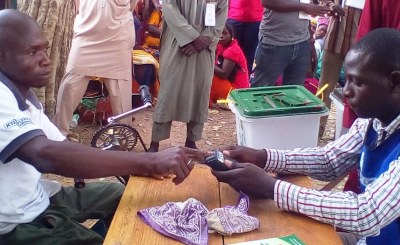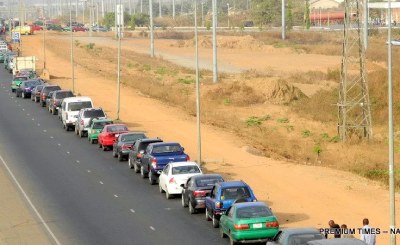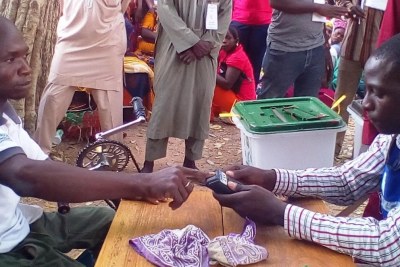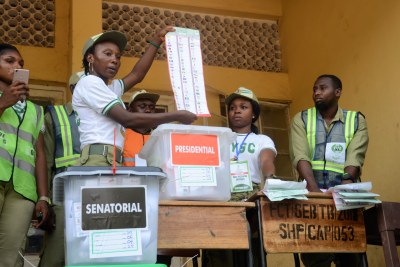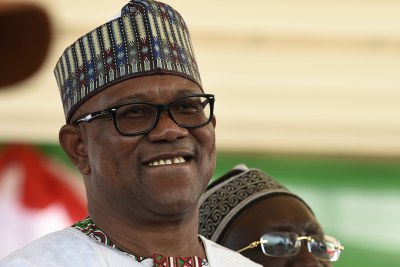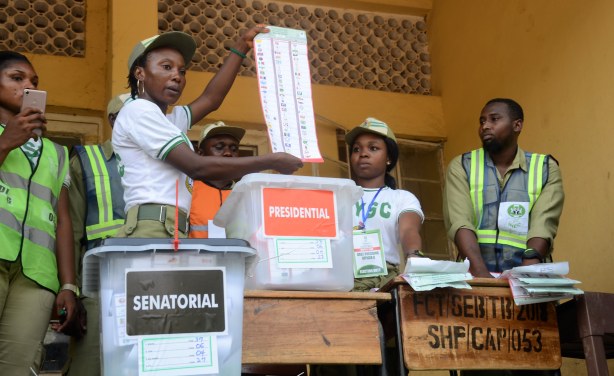-
Nigeria: Nigerians Vote Soon to Choose Next President, Lawmakers
VOA, 7 February 2023
Nigerians will vote on February 25 to choose their next president along with lawmakers in the House and Senate chambers. With 18 candidates vying for the job, experts at a panel… Read more »
-
Nigeria: Oligarchs, Oil and Obi-Dients - the Battle for the Soul of Nigeria
African Arguments, 3 February 2023
The end of the oil-fuelled patronage system may pose the greatest threat to the nation since the Civil War. Therein may lie its salvation. Read more »
-
Nigeria: Five Propaganda Strategies Politicians Deploy During Elections
Premium Times, 7 February 2023
At the moment, election merchants are at the peak of displaying their propagandistic prowess ahead of the forthcoming general elections. Read more »
-
Nigeria: 'Thick Veil of Violence' Around Elections - Human Rights Watch
VOA, 6 February 2023
Human Rights Watch said Monday that there is a "thick veil of violence" surrounding elections scheduled to take place in Nigeria later this month. Read more »
-
Nigeria: New Naira Notes - '13 Political Parties' Threaten to Pull Out of Elections If Deadline Extended
Premium Times, 6 February 2023
The parties commended President Muhammadu Buhari for the redesigning of the banknotes. Read more »
-
Nigeria: Naira Redesign, Fuel Scarcity Could Escalate Tension Ahead of Polls - World Bank
Premium Times, 6 February 2023
The world bank said the Nigerian authorities should consider allowing for a longer implementation period, well beyond February 10. Read more »
-
Nigeria: 'Violence Over Naira Scarcity May Halt 2023 Elections'
Premium Times, 6 February 2023
"If you have riots like you had in Ibadan and Benin - I don't know anywhere else - and they were taking place simultaneously, and you are now dealing with the issue of protecting… Read more »
-
Nigeria: Election Violence in Nigeria's South East Is Threatening to Derail Voting in the Region
The Conversation Africa, 5 February 2023
Violence is a perennial feature of elections in Nigeria. It happens across the three stages of the electoral cycle - before, on and after election day. Read more »
Battle for the Soul of Nigeria
The end of the oil-fuelled patronage system may pose the greatest threat to the nation since the Civil War. Therein may lie its salvation. Nigeria's elections on 25th February will not only be critical to the future of Nigeria, but also to that of the continent, and to an extent the world. It will be taken as a sign of whether democracy is advancing or retreating. As Africa's biggest democracy with some 93 million potential voters - even if turnout has hitherto been well under 50% - Nigeria will be seen as a weathervane for the world at large, writes Nick Westcott for African Arguments.
With a high unemployment rate, worsening poverty level, escalating insecurity, and rising debt burden fuelling dismay in Nigeria, citizens want a credible and competent leader that can tackle these problems, especially insecurity head-on.
Westcott adds that "this election marks an inflection point for Nigeria: the possible beginning of fundamental change, or a step closer to disintegration. Democratic revolutions rarely happen overnight. They take hard graft and long years of campaigning. A growing number of Nigerian citizens want to change the way politics is done and seem willing to persevere. Whatever the outcome of this election, that is a good thing. Whoever is elected will have to recognise that politics is changing. Ruling in the same old way will no longer work: it risks accelerating the country's disintegration, spreading violence and deepening corruption, with Nigeria becoming the first country in Africa effectively to eat itself."
Eighteen presidential candidates will participate in Nigeria's polls. The new president will be sworn in on 29 May and will be constitutionally mandated to manage Nigeria's security governance architecture between 2023 and 2027.
InFocus
-
The Chairperson of the Independent National Electoral Commission (INEC), Mahmood Yakubu, says the INEC is satisfied with the preparations done so far for the elections. Yakubu was ... Read more »
-
All eyes are on Nigeria as it prepares for its general election in February. There is growing concern that insecurity will undermine the process, making it dangerous for voters to ... Read more »
-
Conducted in early December 2022, the results released by Atedo N. A. Peterside Foundation, ANAP, Foundation showed that 23% of voters were willing to vote for Pete Read more »

